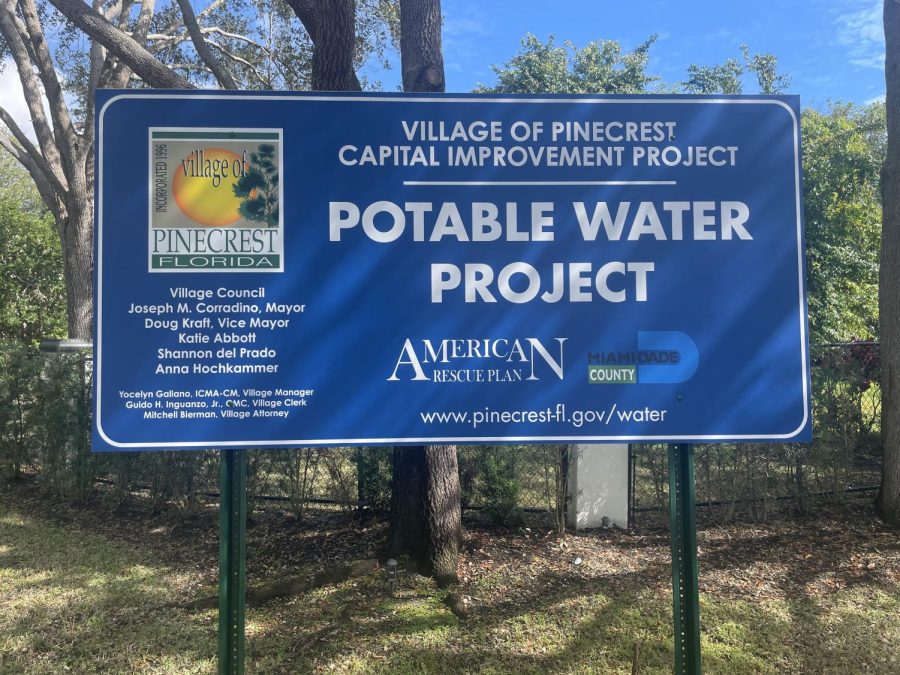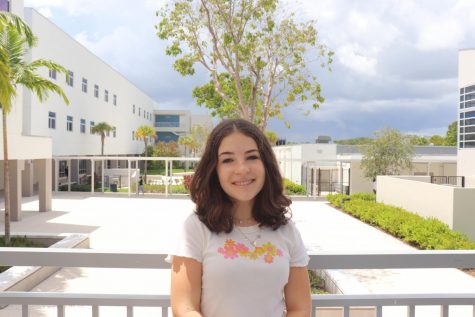Pinecrest Village Potable Water Project Connects Homes to Water
Pinecrest is in the process of connecting homes to the county’s Potable Water System in efforts to improve water infrastructure.
February 20, 2022
Starting Jan. 3, hundreds of Pinecrest homes have begun to receive infrastructure additions connecting them to Miami-Dade County’s Potable Water System for the first time.
Before the project’s initiation in 2004, approximately 1,500 homes in the village did not have access to the county’s potable water system and relied on a well-water system, meaning the homes did not have access to MDC’s Water and Sewer Department.
“Pinecrest was actually quite the rural area when much of Dade County was being developed,” Pinecrest’s Public Works Director David Mendez said. “The people that homesteaded here back in the day didn’t have access to any kind of development, so they had no choice but to dig a well and create a system for their water.”
Well water is especially problematic because of failing wells, the threat of salt-water intrusion and unreliability during storms due to potential power outages. These hundreds of homes also do not have access to fire hydrants, which poses a risk for potential emergencies in the Village.

“Anecdotally, we started getting cases where there were contaminated wells in the Village,” Pinecrest Village Manager Yocelyn Galiano said. “Then, the whole issue of sea level rise started to gain popularity in the sense that more and more people were understanding what the effects would be. So, it was a combination of things that had to happen [to pass the project].”
The search for potable water first began in 2004, when former mayor Gary Matzner attempted to negotiate with the county for the inclusion of funds in the General Obligation Bond, a bond approved by voters, but these funds were not sufficient enough to complete the entire Potable Water Project. Only half of the 1,500 homes received access to water under the bond, leaving 725 Pinecrest residences still without water.
For years, seeking additional funding for the project from state and federal sources was extremely difficult because of the Great Recession of 2008 and later, the COVID-19 pandemic.
However, the pandemic proved to benefit the Potable Water Project since the Biden administration’s American Rescue Plan provided approximately $8.1 million in Federal funds to Pinecrest that could only be used for specific purposes, including water projects, in March 2021.
“It was like the stars aligned and basically, we had a gift that was a big chunk of the cost that the council [was] committed to using,” Galiano said.
While the American Rescue Plan aid funds a majority of the Potable Water Project, it does not cover the entire $10 million needed; the benefitting property owners must pay a special assessment of approximately $358 per year for 25 years to cover the remaining cost.
Since January, water pipeline construction has begun for several Pinecrest homes, a project that requires approximately 90,000 linear feet of ductile iron pipe and 210 fire hydrants, according to Mendez.
Although the project relates specifically to Pinecrest, the neighborhood water system belongs to Dade County — Pinecrest does not operate a water system. Therefore, the construction of water pipelines becomes the property of the county, which is responsible for providing service and maintenance.
In the next few months, Pinecrest will notify affected residents about construction occurring on their street. To install the pipelines and fire hydrants, a construction company will drill a trench into the affected street to place the pipes; temporary asphalt will also be placed so that people can drive on the surface without any issues. Next, the workers check the pressure and bacteria within the pipelines to meet MDC standards.
“Construction is loud. It’s dirty. Unfortunately, you’re digging into the ground, you create dust, you create mounds of dirt, but the workers are working very expeditiously. People should expect no more than about 10 days worth of discomfort when they are working on their block,” Mendez said.
The project remains ongoing from approximately 7:00 a.m. to 6:30 p.m. Mondays through Fridays and from 8:00 a.m. to 4:30 p.m. on Saturdays. The Potable Water Project is scheduled to be completed by this December.
“I can tell you, from the people that are very active in the citizen group that advocated on behalf of this, that they have plenty of people who have a lot of issues with their ability to even use their current wells,” Galiano said. “So, I suspect this will be a huge improvement to these people’s quality of life, and we are really excited.”










